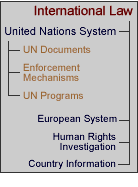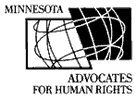|
|
UN Committee on Economic, Social and Cultural RightsThe Committee on Economic, Social and Cultural Rights (CESCR) is established to monitor State compliance with obligations under the International Covenant on Economic, Social and Cultural Rights. The Committee consists of a panel of 18 experts elected by the Economic and Social Council. Currently the Committee on Economic, Social and Cultural Rights carries out its mandate through the reporting/ monitoring process, but the Commission on Human Rights has discussed a draft Optional Protocol that would create a complaint mechanisms. At present, the draft Optional Protocol is available for review and comment by State parties. States which have ratified the International Covenant on Economic, Social and Cultural Rights are required to submit period reports documenting compliance with the provisions of the treaty. The Committee meets twice a year, in May and November/ December, to review the government reports. The Committee asks the government questions about specific articles of the Convention in an effort to “to determine through constructive dialogue whether the norms contained in the Covenant are being adequately applied and how the State Party might improve its implementation of the Covenant.” On the final day of the session, the Committee prepares concluding observations, which may include recommendations for measures to be taken to improve the situation for women in a particular country. As is the case with the concluding observations of the Committee on the Elimination of Discrimination against Women (CEDAW), the recommendations of the CESCR are broad and not legally binding. The Committee on Economic, Social and Cultural Rights has involved non-governmental organizations (NGOs) in the monitoring process. The Committee sessions are open to the public. NGOs are allowed to present specific concerns to Committee members during a pre-sessional period in which working groups review the States that will report at the forthcoming session. The Committee encourages NGOs with consultative status to submit written reports, as alternatives to the State party report, with information that will “contribute to the full and universal recognition and realization of the rights set forth in the [Covenant].” Women’s rights NGOs have successfully used the mechanism of submitting shadow reports to the Committee on Economic, Social and Cultural Rights as a way to bring attention to the issue of violence against women. For example, in November 2002, the World Organization Against Torture (OMCT), an international coalition of NGOs, submitted a shadow report to the Polish government’s periodic report to the Committee on Economic, Social and Cultural Rights, in which it found that “women suffer from discrimination in Poland in both the private and public spheres. This discrimination is exacerbated by cultural stereotypes concerning the role of women, ineffective legislation for the prevention and punishment of violence against women, and inadequate services for women who are victims of violence.” A shadow report prepared by the International Women’s Rights Action Watch to Bulgaria’s Third Periodic Report addresses the issue of sexual harassment and workplace discrimination in the context of the right to just and favorable work conditions (Article 7) and equality between women and men (Article 3). Unlike the UN complaint mechanisms, NGOs are not limited in the number of UN bodies to which they can submit shadow reports. Thus, for the purposes of advocacy, NGOs can bring international attention to issues of violence against women through the monitoring of government obligations under any treaty that protects women’s human rights. The reporting mechanism available under the Committee on Economic, Social and Cultural Rights is summarized below. Reporting Mechanism- Committee on Economic, Social and Cultural Rights
Additional ResourcesUN Fact Sheet No.16 has information about Committee on Economic, Social and Cultural Rights, monitoring implementation of the Covenant and how NGOs can participate in Committee activities. Most UN Fact Sheets can be accessed on the web. The Committee on Economic, Social and Cultural Rights also has a webpage with access to State party reports, the Committee’s concluding observations and the Draft Optional Protocol to the Covenant. More information on writing shadow reports, using shadow reports strategically and sample NGO reports can be found in the Human Rights Investigation and Documentation section of this website. The International Women’s Rights Action Watch (IWRAW), a U.S.-based NGO, has created a procedural guide, Producing NGO Shadow Reports to CEDAW. |
| Home | Contact | Feedback | Disclaimer |

